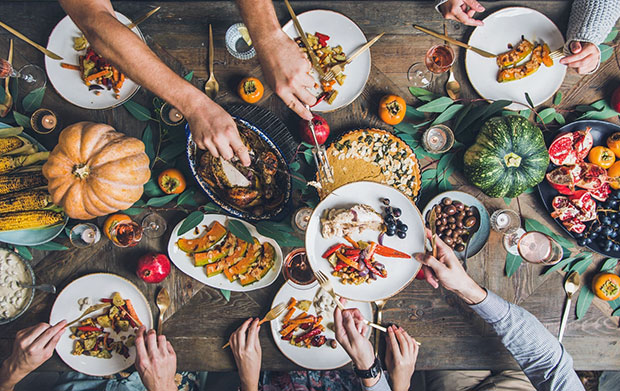Navigating Holiday Food Choices
For some, this will be their first holiday season with family and friends since making a change in their diet. For others, they’ll be spending the holiday away from home and sharing foods from different cultures or customs. Whether adopting a vegetarian or vegan diet, avoiding something that triggers digestive problems like lactose or gluten, or otherwise sharing the holiday with diverse dietary needs or preferences, there are some steps you can take to make sure you have a great holiday meal and minimize stress.

Communicate with your host about your personal needs.
You can choose to share as much or as little information as you feel comfortable with, but this will keep them from being surprised on the big day as well as give them an opportunity to accommodate your needs. Know your audience and have reasonable expectations. If you’re navigating a food allergy or intolerance, consider prepping a brief elevator speech to explain why you aren’t partaking in your usual favorites. Consider the same if you’re following a religious dietary law like Kosher or Halal. You could also let them know if there are easy ways to make a dish safe for you and offer to help cook; topping a casserole with gluten free bread crumbs, mashing potatoes with non-dairy milk, or cooking side items in vegetable broth.
Plan to bring a dish or dishes that you can eat.
For vegetarians, this may mean bringing along a plant based main dish or a side item that would otherwise contain meat. Think about what foods are quintessential holiday foods for you and prepare them yourself. Be sure to bring plenty to share so others can taste what you are enjoying! If you have a friend or family member that is aware of your dietary needs and is supportive, enlist them in bringing a suitable dish as well.
Avoid diet talk.
Diet talk is focused on restricting foods to lose weight or changing diet or exercise with the intention to change body weight or size. It can also be a compliment that is based on physical appearance. It’s easy for food talk to slip into diet talk and it can even be well intentioned; this may come up more often if you’re having to explain why you are or aren’t eating a particular food. It’s okay to slip out of a room or change the subject if the conversation veers into diet talk; it’s also perfectly okay to let someone know if you are uncomfortable with them commenting on your appearance or food choices.
Think outside the box.
If you’re adjusting to a new way of eating, sometimes you’ll miss a traditional dish. Branch out and build non-traditional foods into your menu, like quinoa, polenta or risotto, for a delicious holiday side.
Give thanks.
Let those who have supported you know that you notice and appreciate them. Consider making a gratitude journal to focus on the people, foods, activities, and other aspects of the holidays that bring you joy.
Add a Friendsgiving.
A pre or post-holiday celebration with friends can be a fun way to decompress and enjoy the holiday in a more relaxed setting. As a bonus, you can use this opportunity to test out new recipe ideas (or repeat the big hits). Or take the focus off food: host a holiday craft club, present wrapping party, or holiday movie marathon.
For students in need of additional support resources:
The UGA food pantry is fully stocked and available for students in town. Students should call Student Care and Outreach to set up a time for pick-up (706.542.7774) or contact them via email at SCO@uga.edu with any questions. Information about emergency funding and Graduate Student emergency funding can be found here: Student Affairs emergency fund and Graduate Student emergency fund. Bulldog Basics is also still running for students in town. Students can request basic hygiene items here.

Written by: Beth Kindamo, Nutrition Education Coordinator, UHC Health Promotion
